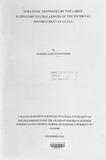| dc.description.abstract | Organisations are open systems which interact with their environment. When an organisation does not monitor feedback from its environment and make appropriate adjustments, it may fail leading to entropy. The purpose of the study was to establish
the strategic responses by the top large taxpayers to the challenges of external environment in Kenya. The objectives of the study were to determine challenges of external environment to top large taxpayers in Kenya and to determine the responses of top large taxpayers to the challenges. The research design used was cross-sectional descriptive survey. The population of the study was all the 26 top large taxpayers as determined by Kenya Revenue Authority. Primary data was collected using questionnaires to the senior corporate officials and senior managers engaged by the top large taxpayers while secondary data was from secondary sources. The data and information obtained through the research instrument was coded and analysed based on descriptive statistics. The descriptive statistics that were used included mean scores, percentages and standard deviation as a measure of dispersion. The study findings indicate that the top three challenges of external environment were economic factors, competition and consumers. Strategic responses of large taxpayers to deal with these challenges included cost containment, outsourcing non-core services, lobbying the national and county governments, reviewing product pricing. Large taxpayers sometimes use internal committees as well as engaging management consultants to assess and deal with the challenges identified. The study recommends that large taxpayers in Kenya should continuously scan external environment with a view to responding appropriately to the challenges. Large taxpayers should continue to engage the national government to ensure that the policies of the country do not create economic challenges and dampen investment. As large taxpayers control a significant portion of the total taxes collected in the country, large taxpayers have clout that can be used to influence the government of the day to devise policies that encourage investment and to remove policies that are harmful to business. The study recommends that in the face of the challenges of external environment, large taxpayers invest further in ICT to achieve greater efficiency and better resource allocation. The study recommends that future research is directed towards strategic responses by all large taxpayers to challenges of external environment instead of the response strategies of the top large taxpayers to challenges of external environment. | |

